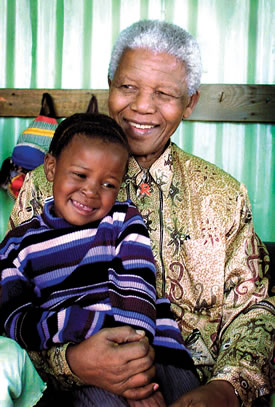Nelson Mandela: His Legacy Lives On
By Omoefe Ogbeide, Lisa Young & Jasmine Bager
 The former South African president, Nelson Mandela, was an advocate for education and freedom, not only for his fellow countrymen, but also for the children of the world. We proudly wrote about Mandela in our 2005 issue, which became one of our favorites. Since then, many events have transpired. Mandela recently passed away at the age of 95, leaving behind decades of awe-inspiring work.
The former South African president, Nelson Mandela, was an advocate for education and freedom, not only for his fellow countrymen, but also for the children of the world. We proudly wrote about Mandela in our 2005 issue, which became one of our favorites. Since then, many events have transpired. Mandela recently passed away at the age of 95, leaving behind decades of awe-inspiring work.
Sacrificing his personal freedom in the name of democratic and social principles, Mandela had a tremendous historical impact. From his early youth, he was actively involved in fighting racial discrimination in South Africa. As a student, he was involved in a protest of the white minority government’s obstruction to basic rights for South Africa’s majority Black African population which had interrupted his own education. He continued to pursue his degree despite the challenges and succeeded.
Receiving his law degree after several setbacks, he opened a law firm with his college friend, Oliver Tambo, which provided free or low-cost legal advice to many Black Africans who otherwise would have been grossly underserviced.
During his years as a student, Mandela began his involvement with the African National Congress (ANC), an organization promoting democratic policies in South Africa. He was instrumental in establishing the ANC Youth League and became its president in 1951.
Following the implementation of apartheid laws by the National Party (NP), which assumed power in 1948, Mandela and other members of the ANC protested apartheid laws through its Defense Campaign. In response to NP threats of disbanding the ANC, the “M” plan was formed. Named after Mandela, the plan resulted in the organization of smaller ANC units, which would encourage the earliest participation in the anti-apartheid movement.
Mandela’s anti-apartheid activities eventually led to his arrest, a five-year sentence in 1956. In 1961 he was acquitted, but was again arrested in 1962 and this time sentenced to life imprisonment. During his incarceration, Mandela covertly engaged in the struggle against apartheid, releasing a statement to the ANC, encouraging Africans to come together in the fight against apartheid. The movement only grew stronger in his stead as his unjust persecution became a symbol to galvanized masses.
Following his February 1990 release from prison, he ran for president of South Africa. He was unanimously voted into office in 1994. After being wrongfully jailed for 27 years during which is mother and eldest son died, Mandela found enlightenment, not resentment. As he described, “As I walked out the door toward the gate that would lead to my freedom, I knew if I didn’t leave my bitterness and hatred behind, I’d still be in prison.” Mandela felt that the time he spent in prison reading letters from his people gave him an insight to their struggle he may never had.
Mandela drew further veneration from his countrymen and the world, as he demanded that his former oppressors be absolved of their transgressions and face no punitive retribution. During his term, he introduced the “Reconstruction and Development Plan,” which fostered economic growth and job creation, housing and basic healthcare. Mandela led South Africa’s shift away from apartheid, which finally ended in 1996. The newly formed constitution of South Africa in 1996 finally guaranteed the promise he and many others had fought for: equality. Mandela’s belief in a better tomorrow, despite his circumstances, separated him from most, “I am fundamentally an optimist. Whether that comes from nature or nurture, I cannot say. Part of being optimistic is keeping one’s head pointed toward the sun, one’s feet moving forward. There were many dark moments when my faith in humanity was sorely tested, but I would not and could not give myself up to despair. That way lays defeat and death”.
Mandela’s contributions to social activism continue today, even after his departure. The Nelson Mandela Foundation works in expansive and varied ways to enrich the global community through charitable work. Their projects include construction of schools, HIV/AIDs research and prevention efforts, rural education research, and peace and reconciliation interventions.
Above all, Nelson Mandela was a loving husband, father and grandfather, and an unforgettable inspiration to the world with his wisdom and kindness. He reminded us that the good is worth fighting for and that education makes it possible. He said, “Education is the most powerful weapon which you can use to change the world.” And the struggle for equality must not end. Especially for the children of today, Mandela’s legacy gives us urgency: “It is not beyond our power to create a world in which all children have access to a good education. Those who do not believe this have small imaginations.”
